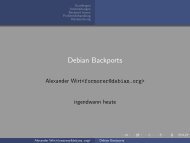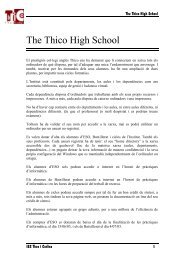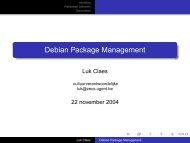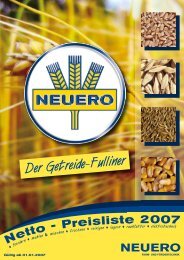Free Software In Biology Using Debian-Med: A Resource For ...
Free Software In Biology Using Debian-Med: A Resource For ...
Free Software In Biology Using Debian-Med: A Resource For ...
You also want an ePaper? Increase the reach of your titles
YUMPU automatically turns print PDFs into web optimized ePapers that Google loves.
<strong>For</strong> <strong>Free</strong> <strong>Software</strong> development to work it requires a critical mass<br />
of supporters. Development without feedback prior to the submission<br />
of the final product is disadvantageous. The development of<br />
programs is not the main concern of a regular Linux Distribution.<br />
However, with the focus on <strong>Free</strong> <strong>Software</strong> and smooth local compilation,<br />
<strong>Debian</strong> considerably eases the contribution of comments and<br />
concise feedback of the technically skilled early adopters. <strong>Debian</strong><br />
such helps to bring developers and users of applications together.<br />
All members of the <strong>Debian</strong> project are connected in a web of trust,<br />
which is woven by signing GnuPG (www.gnupg.org) keys1. A central<br />
requirement to become a member of the <strong>Debian</strong> project is to<br />
have one’s GPG key signed by an already accepted member of the<br />
<strong>Debian</strong> community. When <strong>Debian</strong> developers first meet in person,<br />
they sign each other’s keys. Thus, the web of trust is woven.<br />
<strong>Debian</strong> does its best to have every member profit of somebody<br />
else’s work as quickly as possible.<br />
2.2.1 <strong>Debian</strong> Policy<br />
All GNU/Linux distributions have a certain amount of common<br />
ground, and the Linux Standard Base (LSB)[27] is attempting to<br />
develop and promote a set of standards that will increase compatibility<br />
among Linux distributions, hereby enabling software applications<br />
to run on any compliant system. The very essence of any<br />
distribution, (whether delivered as RPMs, DEBs, Source tarballs or<br />
ports) is the choice of policy statements.<br />
Policy statements in <strong>Debian</strong>[12] specify configuration files to reside<br />
in /etc/\$package/\$package.conf, logfiles go to<br />
/var/log/\$package/\$package.log and the documentation<br />
files to be located in /usr/share/doc/\$package.<br />
CGI-scripts are installed in /usr/lib/cgi-bin.<br />
The policy statements are followed by the tool-chains and libraries<br />
used to build the software, and the lists of dependencies, which<br />
dictate the prerequisites and order in which the software has to be<br />
built and installed.<br />
Policies in <strong>Debian</strong> are developed within the community. Commonly<br />
with a single person or a small team drafting it, with further<br />
refinements being discussed in respective mailing lists.<br />
While every single maintainer of a <strong>Debian</strong> package has to build<br />
the package in compliance with the policy he has the ability and<br />
the right to decide which software is worth packaging. Normally<br />
maintainers choose the software which is used in their own work<br />
and they are free to move the development of <strong>Debian</strong> in a certain<br />
direction (as long as they follow the rules of the policy). This is<br />
referred to as Do-o-cracy in <strong>Debian</strong> which means: The doer decides<br />
what is done.<br />
2.3 Selection of packages<br />
<strong>Debian</strong> contains nearly 10000 binary packages, and this number is<br />
constantly increasing. There is no single user who needs all these<br />
packages. The regular user is interested in a subset of these packages.<br />
To specify packages of one’s particular interest, several options<br />
are provided by <strong>Debian</strong>:<br />
tasksel Provision of a reasonable selection of rather general tasks<br />
that can be accomplished using a set of packages installed<br />
on a <strong>Debian</strong> GNU/Linux system. However, these are not yet<br />
covering scientific applications. The CDD toolkit which is<br />
currently developed will also support tasksel to enable<br />
selecting for instance <strong>Debian</strong>-<strong>Med</strong> right after a fresh installation<br />
of a general <strong>Debian</strong> system.<br />
standard package management dpkg and apt provide means<br />
to search for packages of particular interest by its name or<br />
words in the package’s description. Every package also indicates,<br />
as set by its maintainer, references to other packages<br />
of potential interest.<br />
<strong>In</strong> its current development, an ontology of applications of software,<br />
upon which semantical queries could be performed, analogous to<br />
Moby-S and BioMoby [17, 26] effort, is not available.<br />
A package management system is a very strong tool to manage<br />
software packages on your computer. A large amount of the work<br />
of a distributor is building these software packages. The <strong>Debian</strong><br />
package management tools have been ported to MacOS X[22] and<br />
other Linux Distributions[14].<br />
<strong>Debian</strong> officially maintains 11 different architectures with many<br />
more not officially supported ports to other operating systems,<br />
which includes some that run another flavour of UNIX. Its technology<br />
for package management has been adopted for other operating<br />
systems, i.e. Fink on MacOSX (fink.sourceforge.net).<br />
A distribution is a collection of software packages around the GNU<br />
Linux operating system that satisfies the needs of the target user<br />
group. There are general distributions, which try to support all<br />
users, and there are several specialised distributions, which each<br />
target a special group of users.<br />
Distributors are those companies that are building these collections<br />
of software around the GNU Linux operating system. Since the<br />
software is <strong>Free</strong>, the user who buys a distribution pays for the service<br />
that the distributor is providing. These services might be:<br />
• Preparing a useful collection of software around GNU Linux.<br />
• Caring for smooth installation that the target user is able to<br />
manage.<br />
• Providing software updates and security fixes.<br />
• Writing documentation and translations to enable the user to<br />
use the distribution with maximum effect.<br />
• Selling Boxes with ready to install CDs and printed documentation.<br />
• Offering training and qualification.<br />
The best established Distributors of GNU/Linux systems are Mandrake,<br />
RedHat, SuSE (now owned by Novell) and <strong>Debian</strong>. Linspire,<br />
Xandros, MEPIS and Ubuntu are well known derivates of<br />
<strong>Debian</strong>.<br />
3. RESULTS<br />
3.1 Bioinformatics and <strong>Debian</strong>-associated<br />
repositories<br />
Bio-Linux Bioinformatics package repository The Bio-Linux<br />
Bioinformatics package repository contains the Bio-Linux






